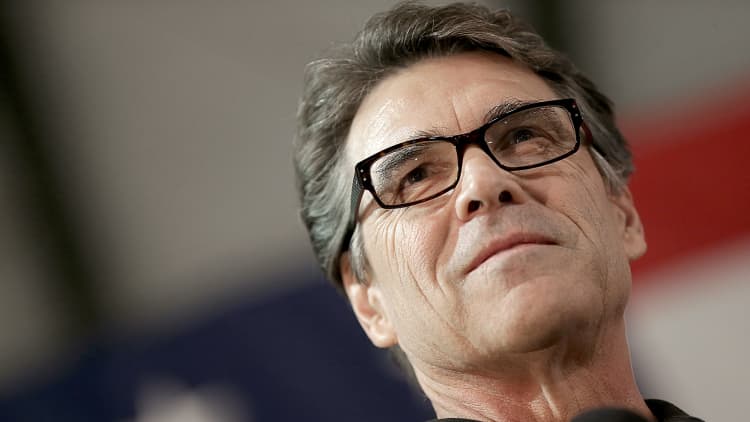
Energy Secretary Rick Perry told CNBC on Monday he does not believe carbon dioxide emissions from human activity are the main driver of climate change, joining the EPA administrator in casting doubt on the conclusion of some of the government's top scientists.
Asked whether CO2 emissions are primarily responsible for climate change, Perry told CNBC's "Squawk Box": "No, most likely the primary control knob is the ocean waters and this environment that we live in."
"The fact is this shouldn't be a debate about, 'Is the climate changing, is man having an effect on it?' Yeah, we are. The question should be just how much, and what are the policy changes that we need to make to effect that?" he said.
In March, Environmental Protection Agency Administrator Scott Pruitt told "Squawk Box" he does not believe carbon dioxide is a primary contributor to global warming.
Those statements contradict the public stance of the Environmental Protection Agency, at least until recently.
WATCH: The full CNBC interview with US Energy Secretary Rick Perry

The EPA's webpage on the causes of climate change used to state, "Carbon dioxide is the primary greenhouse gas that is contributing to recent climate change." The EPA recently took down the web page containing that statement.
Perry and Pruitt's views are also at odds with the conclusion of NASA and the National Oceanic and Atmospheric Administration.
Despite those conclusions, Perry said, "This idea that science is just absolutely settled and if you don't believe it's settled then somehow you're another neanderthal, that is so inappropriate from my perspective."
Being a skeptic about climate change issues is "quite all right," he said, suggesting that skepticism is a sign of a "wise, intellectually engaged person."
President Donald Trump announced this month he would pull the United States out of the Paris climate agreement, an international effort to mitigate the effects of global warming. Since then, most of the president's surrogates have declined to say whether he believes in climate change.
The Trump administration has proposed slashing the Department of Energy's funding.
The Energy Department is shutting down the Office of International Climate and Technology, which works with other countries to develop clean energy technology, The New York Times reported last week. Under Trump, the United States has also backed away from a pledge to double research and development spending on energy technology to $6.4 billion by 2021.


